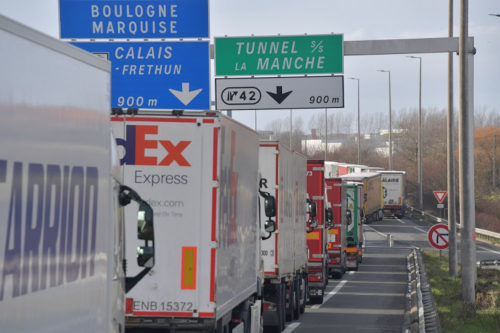Lorry queues stretched back for miles at the port of Calais in France on Tuesday as border officials worked to rule in protest over Brexit.
French customs officials have been warning of long delays at Calais after Brexit and on Monday began strike action designed to demonstrate how inefficient checks will be once the UK leaves the EU on March 29.
Working to rule is a form of industrial action that sees workers follow the rules and hours of employment that is contractually required of them, often in order to reduce efficiency and output, and undertake no overtime.
Staff at the border have demanded higher pay and greater resources, claiming delays will become the norm if tighter controls are implemented, French media reported on Tuesday.
Lille-based reporter Lionel Top, who works for French media outlet BFP, today posted drone footage of the tailbacks.
He said customs officers have been working “to the letter” to show how Brexit will likely gridlock the port and delay goods vehicles travelling to Britain.
Vincent Thomazo, from French transport union the UNSA, told AFP: “Agents are doing longer checks than usual and it creates traffic jams immediately.
“It’s a strike that might last a long time because officers are just doing their jobs.”
French media have reported trade unions are calling for higher overnight pay, a danger allowance, and more staff to deal with any issues Brexit brings about.
In response, the French government has promised to recruit an additional 700 customs officials, but some working on the ports do not think it’s enough.
Dunkirk, further up the French coast, has also been affected. “Brexit is a catalyst for deeper anger,” a union member told the BBC.
Trucks and lorries have been slowed since Monday, some for up to an extra six hours, and many drivers have been sounding their horns in frustration, according to ferry operator DFDS. Regular traffic has been moving normally, however.
Reports also said migrants had been seen attempting to board some of the waiting transport in a bid of crossing the Channel into Britain.
Many believe that stricter checks at borders will be inevitable, and wait times longer, even with addition staff either side of the water.
“If the UK becomes a third country, checks will become more in-depth. This is the first full demonstration of what will happen,” CGT union official Philippe Bollengier told AFP.
But Rodolphe Gintz, head of French customs, insisted France will be ready to deal with the movement of goods post-Brexit.
In January, the UK Government carried out a major post-Brexit test to establish the implications of a no deal on traffic and border disruption at Dover.
Queues are expected across Kent once the UK leaves the EU. A rehearsal with 100s of HGVs took place on Manston Airfield to see how the A256 will cope.












